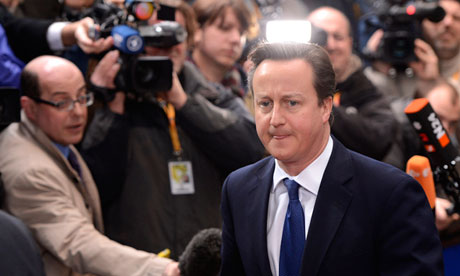
EU summit breaks up without agreement over budget
2012-11-24 06:44:56
Herman Van Rompuy postpones negotiations after member states fail to resolve differences
European leaders face a grinding round of negotiations over the next three
months to agree a new seven-year budget after the EU summit collapsed in
Brussels amid a clash between rich and poor nations.
Herman Van Rompuy, the president of the European council, threw in the towel
after an alliance of the EU's richest countries, led by Britain and Germany,
declined to accept a أ¢â€?آ¬971bn (أ‚آ£786bn) budget for 2014-2020.
The decision to abandon the talks, which will lead to another emergency budget
summit early in the New Year, will transform the position of David Cameron who
arrived in Brussels amid criticism that he is wholly isolated in the EU.
The prime minister joined forces with Angela Merkel, the German chancellor, Mark
Rutte, the Dutch prime minister, and Fredrik Reinfeldt, the Swedish prime
minister, to say the proposed budget was too large.
Merkel was understood to have been furious with Van Rompuy and Josأƒآ© Manuel
Barroso, the European Commission president, for an attempt to try and isolate
Britain.
Speaking after the summit broke up the prime minister said: "It has been very
heartening that, as well as myself arguing for significant reductions and being
on the side of taxpayers the Swedes and the Dutch have made very strong
representations too.
"I think attempts there might have been to try and أ¢â‚¬â€œ 'well, let's just put the
British in a box over there and try and do a deal without them' أ¢â‚¬â€œ well that
didn't work.
"There were other countries I have worked with together were making sure that we
were all standing up together for taxpayers and to make sure we have a fair
outcome to this budget when we are cutting our budgets at home."
Van Rompuy had informally proposed lowering his أ¢â€?آ¬971bn budget to أ¢â€?آ¬940bn
according to the "payment ceiling" which covers the money the EU would
distribute rather than the higher "commitment ceiling". This is described by
Britain as a credit card limit.
The prime minister argued for a further cut of أ¢â€?آ¬50bn in the proposed أ¢â€?آ¬940bn
budget, taking it closer to the original British demand of a أ¢â€?آ¬885.6bn budget.
The Dutch demanded an even bigger cut of أ¢â€?آ¬100bn. Merkel was keen to see further
cuts on the Van Rompuy proposal, though she believed that the أ¢â€?آ¬50bn suggested by
Britain went too far.
The summit highlighted deep splits between rich "contributor" nations and poorer
"recipient" nations.
France was the key swing country. It is a net contributor but Franأƒآ§ois Hollande
was determined to protect billions of euros in agricultural payments. Van Rompuy
proposed increasing the Common Agricultural Policy (CAP) budget by أ¢â€?آ¬8bn
overnight. This was unacceptable to the Netherlands.
Cameron radiated satisfaction with the deadlock, but he was helped enormously
and surprisingly by Merkel who blocked all attempts to isolate the veto-wielding
prime minister and so prevent a much worse bust-up.
British and other senior officials said that Merkel, who saw her role as the
central mediator in balancing the conflicting interests and crafting a
compromise, came down strongly on Cameron's side in pushing for greater spending
cuts, and supported awarding him a symbolic victory by cutting the costs of EU
administration and civil service.
The Merkel backing for Cameron brought French complaints of the surprise
emergence of a "Berlin-London" axis. But if this appeared to have some
foundation, the alliance was directed not against Paris but at Brussels.
Participants confirmed that Merkel concluded that Van Rompuy and Barroso, who
were running the summit, were pursuing a deliberate strategy of trying to
quarantine Britain in the budget battle and produce a 26 against one situation
in which Cameron would have been forced to play his veto.
She told the summit yesterday afternoon that if there was going to be an
agreement "it has to be at 27."
The charge against the Van Rompuy-Barroso duo was that they were ignoring
Cameron, acting as if he was not even in the room, engineering a situation where
the British felt unwanted.
A Cameron veto would have torpedoed the seven-year spending programme, forcing
EU leaders into messy negotiations every year over a new annual budget. Merkel
was desperate to avoid that scenario.
"She's been very supportive," said a British official.
"People are unhappy with the way this summit was organised."
There may, however, be a price to pay for the help. Next month's summit is
supposed to reach agreement on making the European Central Bank in Frankfurt the
new banking supervisor for the eurozone, a policy to which Britain has serious
objections and over which it is seeking concessions from the 17 countries of the
eurozone led by Germany.
Cameron may find that Berlin will be less accommodating on British demands on
the budget when they return to grapple with the issue in the new year unless he
shows more flexibility on the banking union in three weeks time.
EU leaders will be keen to reach an agreement on the 2014-2020 budget because it
will revert to more expensive annual budgets if no deal is reached.
Comments